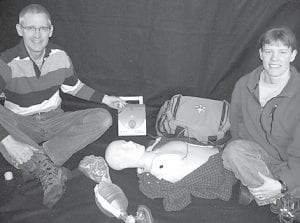Effective bystander CPR provided immediately after sudden cardiac arrest can double or even triple a victim’s chance of survival. Quick use of an automated external defibrillator (AED) can increase the chance even more. Paul and Kelly Dahl of Northcountry CPR are offering courses in CPR and how to operate an automated external defibrillator, as well as basic first aid training. They will tailor the training to meet a business or organization’s needs or schedule.

Kelly and Paul Dahl, both RNs and EMTs, have seen firsthand how early interventions with first aid or CPR (cardiopulmonary resuscitation) can save lives. As American Heart Association CPR and first aid instructors, they both have a desire to reach out to the community to teach basic life-saving skills. Inspired by the recent successful resuscitation of a 54-year-old Minnesota man who was given CPR for approximately 90 minutes, Kelly and Paul started a new first aid/CPR training company, Northcountry CPR.
According to the American Heart Association, nearly 300,000 out-of-hospital sudden cardiac arrests occur annually, with 80 percent of them occurring in the home. Statistically speaking, if you have to give CPR in an emergency, the life you save is likely to be someone at home: a child, a spouse, a parent, or a friend. Effective bystander CPR provided immediately after sudden cardiac arrest can double or even triple a victim’s chance of survival. Quick use of an automated external defibrillator (AED) can increase that chance even more. Unfortunately, according to the American Heart Association, only 32 percent of cardiac arrest victims get CPR from a bystander. Northcountry CPR was created to help address this problem.
Early defibrillation skills with an AED are included in all CPR classes at Northcountry CPR. AEDs are becoming more common in schools, churches, shopping malls, airports, etc. It is important to be comfortable with these devices. AEDs are user friendly and the Dahls train everyone how to use these simple, life saving machines. “Early defibrillation is needed for the treatment of sudden cardiac arrest. Immediate administration of proper CPR in conjunction with early defibrillation with an AED can mean the difference between life and death. Seconds count,” states Kelly.
Northcountry CPR also teaches OSHA-approved first aid training. Many companies require first aid training, especially those in the industrial setting such as loggers. Quality training gives people the peace of mind they can help in just about any emergency. “When people don’t know what to do, they can easily panic and the situation for the victim can quickly go from bad to worse. We use multiple scenarios in our training so students become comfortable with skills such as controlling bleeding or basic splinting. We do hands-on training. We don’t just show you a video, have you take a written test, and then send you out the door. Active participation is the cornerstone of learning these skills,” says Paul.
Northcountry CPR has American Heart Association classes that are approved for camp counselors, canoe guides, industrial setting personnel, healthcare providers, and folks who just want to know the first few important steps in dealing with an emergency.
“Whether it is first aid or CPR, we have fun in class, which is the best way to learn. We come to you at the time you schedule and your location. We’re flexible with scheduling and number of participants. Everyone should know CPR and first aid because it can save lives,” say the Dahls.
For more information or to contact the Dahls go to their website at www.northcountrycpr.com, e-mail Kelly Dahl at Kelly@northcountrycpr.com, or call 218- 388-9498.


Loading Comments